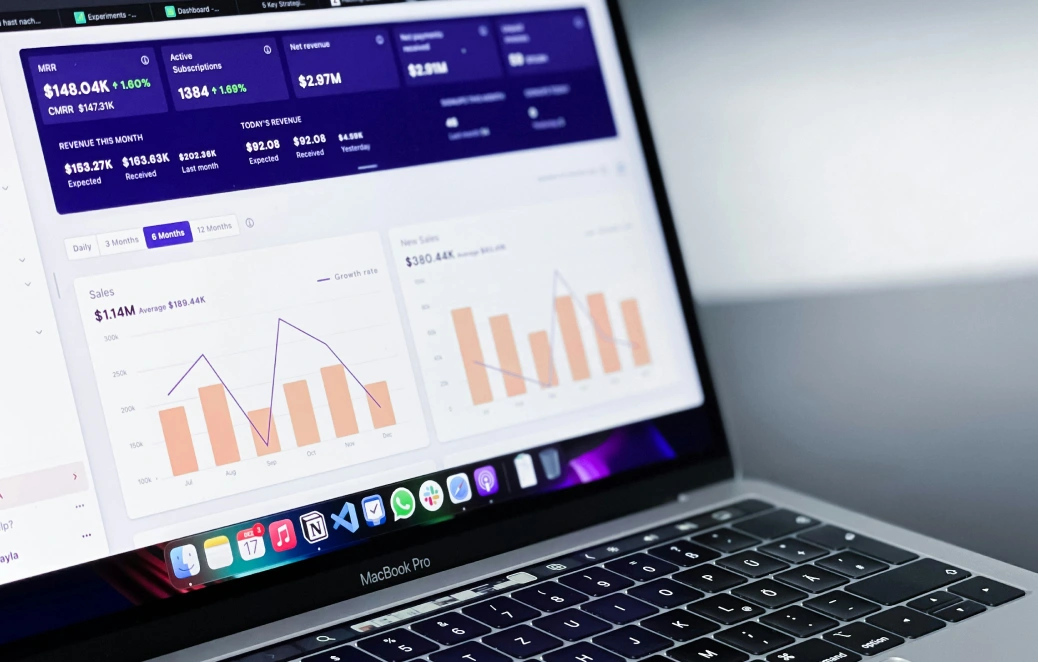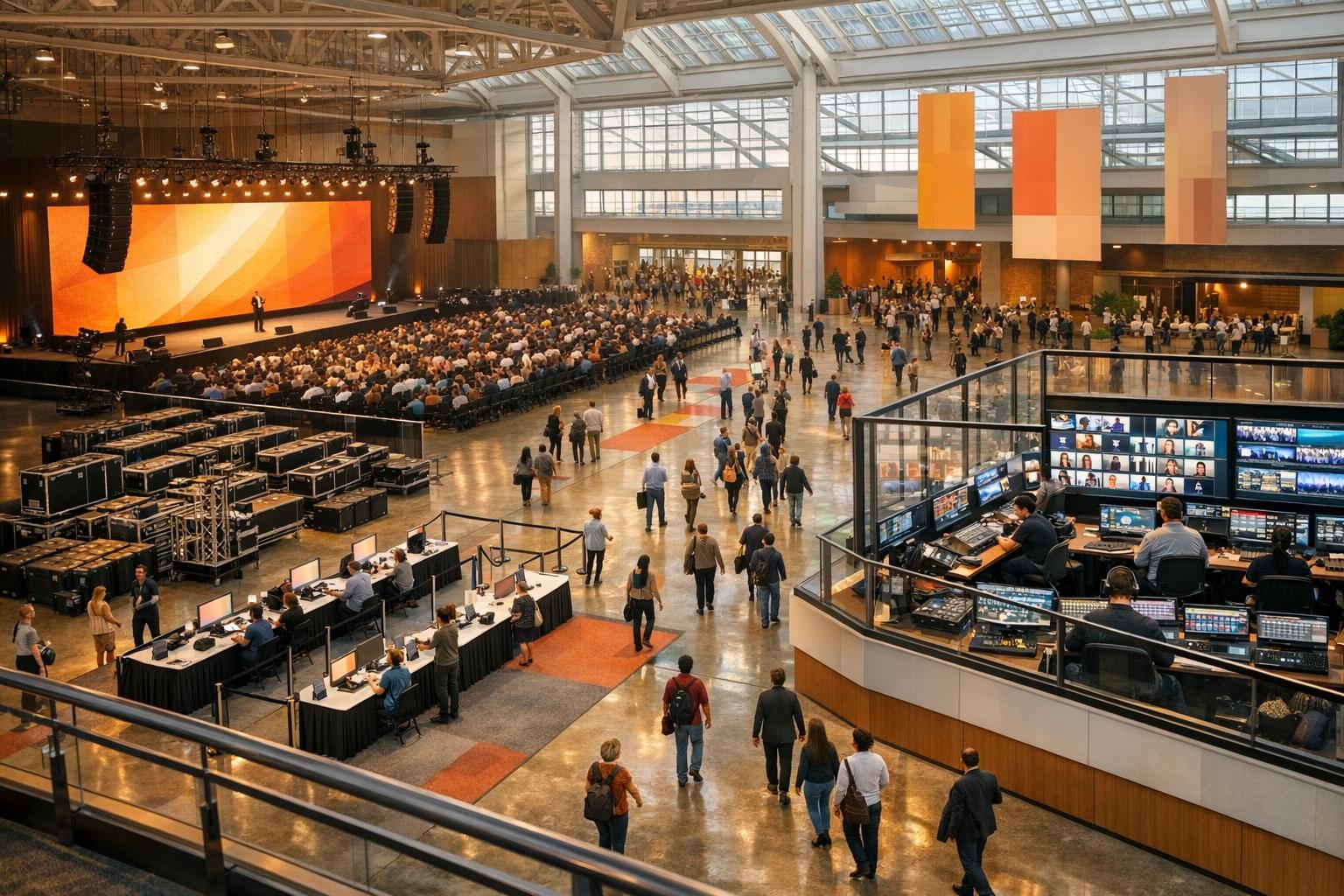Guide To Selecting A Production Company For A Leadership Conference

Chief Executive Officer

When planning a leadership conference, the right production company can make or break your event. Here's what you need to know upfront:
- Define Your Goals: Identify the purpose of your event (e.g., strategic planning, leadership development) and the format (keynotes, panels, hybrid options). This shapes your technical and logistical needs.
- Key Requirements: Look for expertise in AV equipment, live streaming, stage design, and audience engagement tools like polling or Q&A. Professional lighting, sound design, and hybrid capabilities are essential for executive-level events.
- Evaluate Experience: Choose a company with a proven track record in leadership events, especially for similar industries or event scales. Check their portfolio, client retention, and references.
- Assess Technical Skills: Ensure they use high-quality equipment, have contingency plans, and offer post-production services like editing and analytics.
- Customization Matters: Avoid one-size-fits-all solutions. Opt for companies that tailor their services to your specific needs and can handle both small and large events.
- Ask the Right Questions: Inquire about their experience, problem-solving approach, and ability to deliver measurable results. Confirm their on-site team structure and communication protocols.
- Compare and Choose: Use a comparison chart to evaluate options based on experience, pricing, AV capabilities, and client feedback. Validate your choice with references and review contracts carefully.
Quick Tip: A full-service provider simplifies planning by handling everything from design to execution, ensuring consistency and reducing stress. Look for clear deliverables, transparent pricing, and a solid backup plan in your contract.
The High-Stakes World of Event Production with Rennie Colelli
Leadership Conference Requirements
Setting clear event requirements is a crucial first step before diving into the search for production partners.
Setting Conference Goals
Before you start evaluating production companies, it’s essential to define the purpose of your leadership conference. Is the event focused on strategic planning, leadership development, change management, or providing industry insights? Each objective requires specific technical capabilities and tailored content delivery methods.
You’ll also need to consider your audience and the event format. Will it feature keynote speeches, breakout sessions, panel discussions, or networking opportunities? These decisions will shape your requirements for technology, stage design, and audiovisual (AV) equipment.
The outcomes you’re aiming for play a big role, too. For example, if you plan to gauge attendee engagement with tools like live polling or post-event surveys, your production partner must have experience with audience engagement tools and data analytics. Similarly, if you intend to repurpose event content for training or marketing, you’ll need a team skilled in professional recording and live streaming. Defining these goals upfront ensures your technical and logistical needs are met.
Key Event Elements
Leadership conferences come with unique demands, and production teams must handle them with precision. Speaker support goes far beyond microphones - executives often require teleprompters, confidence monitors, clickers, and reliable backup systems. Scheduling technical rehearsals is critical to address the specific needs of high-profile speakers.
Hybrid options are increasingly important. This means providing not just live streaming but also virtual breakout sessions and interactive elements for remote participants. Multiple camera angles, professional lighting setups, and dependable internet connectivity are must-haves to ensure a polished experience for both in-person and virtual audiences.
To engage attendees, consider integrating tools like real-time polling, live Q&A sessions, networking apps, and social media platforms. These features must be supported by a technical team capable of meeting the high standards expected at executive-level events.
Visual presentation matters, too. Stage design, lighting, and branded environments should not only look impressive in person but also translate well on camera. The production team must understand how lighting impacts both physical visibility and streaming quality, ensuring a consistent and professional appearance across all formats.
Full-Service Planning Benefits
A full-service approach can simplify the entire process, offering a seamless experience from concept development to post-event analysis. These teams handle everything, ensuring consistency, streamlined coordination, and single-point accountability, which eliminates the hassle of juggling multiple vendors.
With in-house capabilities, full-service providers can maintain creative control, ensure design consistency, and deliver faster turnarounds. They also manage technical execution and post-event analytics, providing actionable insights to improve future conferences.
One of the biggest advantages of full-service planning is contingency preparation. Whether it’s a technical glitch, unexpected weather, or a last-minute speaker change, experienced teams anticipate potential issues and have backup solutions ready. This kind of preparation ensures that your leadership conference maintains its professional standards, no matter what challenges arise.
Additionally, full-service planning simplifies budgeting and contract management by offering transparent, itemized pricing and a single point of contact for all event needs.
How to Evaluate Production Companies
Once you've nailed down your conference requirements, the next step is to carefully evaluate potential production partners. This means looking past fancy websites and polished marketing materials to dig into their actual capabilities and track record.
Corporate Event Experience
Start by assessing the company's experience with leadership events that match the scale and complexity of your own. Look for teams that have successfully handled events like board meetings, executive retreats, or high-profile C-suite presentations. These types of events come with unique demands, and a company familiar with these pressures is more likely to deliver smoothly.
Pay attention to their client portfolio - especially if it includes Fortune 500 companies, government agencies, or major nonprofits. Long-term partnerships with such clients are a good sign of reliability and adaptability. Also, evaluate their range of experience across different event formats. A solid production partner should be equally skilled in managing intimate boardroom discussions and large-scale conferences. They should also be comfortable with diverse presentation styles, from formal keynotes to interactive workshops, and know how to tailor their technical approach to each.
Once you've reviewed their event experience, dive into their technical capabilities.
Technical Skills and AV Equipment
Leadership conferences demand top-notch audiovisual and streaming expertise. Check if the company has experience with multi-camera setups, professional lighting systems, and high-quality broadcast equipment. These tools are essential for delivering a polished experience, whether you're streaming live to remote audiences or recording content for later use.
Ensure they work with enterprise-level streaming platforms, LED walls, professional-grade lighting, and multi-camera systems. A great production partner will stay up to date with the latest tech trends and suggest tools that enhance audience engagement without complicating things for speakers or attendees.
Pay special attention to their sound design skills. Leadership events often feature a mix of formats, from large presentations to smaller breakout discussions. The team should know how to handle wireless microphones, manage acoustics, and deliver clear audio for both live and recorded sessions.
But technical expertise isn't everything. Flexibility and a tailored approach are just as critical.
Custom Services and Flexibility
Look for production teams that take the time to understand your goals and constraints before offering solutions. The best companies avoid cookie-cutter packages and instead focus on creating customized plans that fit your event's specific needs.
Scalability is another important factor. Your production partner should be capable of handling both small, intimate gatherings and large conferences with hundreds of attendees. They should also be transparent about how their services adapt to different budgets and event sizes.
Their problem-solving approach can be a key indicator of their capabilities. During early discussions, present them with potential challenges your event might face. How do they respond to questions about backup plans, last-minute changes, or technical hiccups? Their answers will reveal whether they're proactive thinkers or merely reactive.
Lastly, confirm their ability to operate across multiple locations if your event requires it. Some companies have national networks that ensure consistent service quality in various regions, while others may specialize in specific areas. Make sure their reach aligns with your event's needs.
sbb-itb-ae35a94
Questions to Ask Production Companies
When you're evaluating production companies for your event, it's crucial to dig deeper than surface-level qualifications. The questions you ask during your initial conversations will help uncover their experience, technical expertise, and ability to tackle challenges effectively.
Experience and Track Record
Start by asking for examples of leadership events they've managed that are similar in size and complexity to yours. What unique challenges did they face, and how did they handle them? For a clearer picture, request details about their most demanding leadership conference from the past two years, including specifics about the scale, technical setup, and any obstacles they had to overcome.
It’s also important to learn how many leadership conferences they’ve produced in your industry or a similar field. For example, a company experienced in financial services events will have a different understanding of compliance standards and formal presentation needs compared to one that typically works with tech startups. Request examples of events they’ve handled for organizations of a similar size and scope to yours.
Client retention is another key indicator of reliability. Ask how long their partnerships typically last and whether they have clients who’ve worked with them for multiple events. Request contact information for three clients they’ve served for at least two consecutive events, and confirm if it’s okay to reach out for references.
Finally, inquire about the background and credentials of their team members. Do their technical staff hold certifications from organizations like InfoComm or the Audio Engineering Society? Have their project managers worked on high-profile events, such as those for Fortune 500 companies or government agencies? The expertise of individual team members is just as critical as the company’s overall experience.
Technology and Equipment
Understanding their approach to technology is vital. Ask which platforms they use for live streaming and hybrid events. Do they own their equipment, or do they rely on rentals? Owning equipment often suggests better reliability and deeper technical knowledge.
Dive into their contingency planning. How do they prevent streaming failures? Ask about backup internet connections, duplicate cameras, and alternative power sources. A professional company should have a detailed plan for every potential technical hiccup.
Audio is another key area to explore. Ask how they manage sound in challenging spaces, such as hotel ballrooms with high ceilings or conference centers with poor acoustics. Request examples of how they’ve successfully resolved audio issues in venues similar to yours.
Don't forget post-production capabilities. If you need edited highlight reels or session recordings, ask about their turnaround times. Will they provide raw footage if you want it, or only finished products? Knowing their post-event services will help you plan your follow-up strategy for distributing content.
Problem-Solving and Results Tracking
Beyond their technical and experiential qualifications, you’ll want to know how they handle challenges and measure success. For example, how would they manage unexpected scenarios like a delayed speaker, a last-minute venue change, or a live Q&A technical failure? Their answers will reveal their ability to think on their feet and resolve issues proactively.
Ask about their on-site team structure. Will there be a dedicated point of contact for urgent changes, or will you need to coordinate with multiple team members? A clear communication plan can prevent confusion during high-stress moments.
Finally, inquire about measurable outcomes from similar events they’ve managed. Can they provide data such as viewership numbers, engagement metrics, or client satisfaction scores? Companies that track and share performance data show accountability and a commitment to improving.
Don’t overlook their quality assurance process. Do they run technical rehearsals before every event? How do they test streaming connections and backup systems? What’s their timeline for final equipment checks and sound testing? A thorough QA process minimizes the risk of technical issues during your event.
Comparing and Choosing Your Partner
After gathering information from multiple production companies, the next step is to compare your options and make an informed decision. This process requires a structured approach to ensure you're evaluating companies fairly and selecting the one that best aligns with the needs of your leadership conference.
Building a Comparison Chart
A comparison chart can help you objectively evaluate each production company based on key criteria. Include factors like experience with leadership events, technical capabilities, service offerings, pricing, and client satisfaction. Use a simple rating system, such as a 1-5 scale or categories like excellent, good, fair, or poor.
| Criteria | Company A | Company B | Company C |
|---|---|---|---|
| Leadership Event Experience | 15+ leadership events | 8 leadership events | 3 leadership events |
| AV Equipment Quality | Owns latest 4K cameras, backup systems | Rents equipment, limited backup | Mixed owned/rented, good backup |
| Live Streaming Capability | Multi-platform, redundant connections | Single platform, basic setup | Multi-platform, advanced features |
| Post-Production Services | 48-hour turnaround, full editing | 1-week turnaround, basic editing | 72-hour turnaround, custom options |
| Pricing | $85,000 | $62,000 | $78,000 |
| Client References | 5 Fortune 500 companies | 3 mid-size companies | 2 Fortune 500, 4 mid-size |
While price is important, focus on the overall value each company offers. A higher-priced option might include services that others list as add-ons, like project management, comprehensive rehearsals, or extended post-event support. Carefully review what’s included in the base price versus additional costs.
It’s also worth considering scalability. Can the company handle a larger event if your leadership conference grows in the future? If a company is already operating at full capacity with your current needs, they may not be a suitable long-term partner.
Checking References
Once you've scored each provider using your comparison chart, the next step is to validate your findings by speaking directly with their past clients. Reference calls can provide insights into the company’s real-world performance that might not come up during sales presentations.
Ask detailed questions about their experience:
- Did the company deliver on their promises?
- Were there any unexpected challenges or additional charges?
- How did they handle last-minute changes or technical issues?
To ensure you're getting an accurate picture, focus on references from events of a similar scale held within the past 18 months. Companies evolve, and older references might not reflect their current capabilities. Additionally, don't just ask about successes - find out how they handled problems. For example, a company that resolved minor technical issues quickly and communicated clearly might be more reliable than one with a flawless but untested track record.
Contract Details and Clear Expectations
Once references confirm a company’s performance, finalize your decision by reviewing the contract carefully. A well-drafted contract ensures that all expectations are clear and helps avoid misunderstandings.
Here’s what to look for:
- Specific Deliverables and Timelines: Avoid vague terms like "professional video production." Instead, look for detailed descriptions, such as "4K recording of all main stage sessions, edited highlights reel delivered within 72 hours, and raw footage provided within one week." Specificity ensures accountability.
- Payment Terms: Payments should align with project milestones. Typically, reputable companies request 25-30% upfront, with the remaining balance tied to specific stages of completion. Be cautious of companies asking for large upfront payments or full payment before the event.
- Change Order Process: Include a written process for handling last-minute changes. This should detail how modifications are approved and priced, reducing the risk of disputes over unexpected charges.
- Cancellation and Force Majeure Clauses: Understand your options if the event is postponed or canceled, or if external factors prevent the company from delivering services. The contract should clearly outline refund policies and alternative arrangements for rescheduling.
- Communication Protocols: Establish who your primary point of contact will be, their expected response time for urgent requests, and the escalation process for resolving issues. While these details might seem minor, they become critical when making time-sensitive decisions during event planning.
Key Takeaways
When selecting a production company for your event, it’s crucial to focus on factors that directly influence the quality and success of the experience. Look for a team with a proven track record in corporate and leadership events - this kind of expertise can make all the difference.
Technical skills are non-negotiable. Your production partner must be well-versed in modern audiovisual technology, from live streaming to post-production. These tools are essential for delivering a polished and engaging event.
Customization and flexibility are key. The right partner will adapt their services to align with your event’s objectives, audience, and brand identity. This could include custom stage setups, branded visuals, or interactive features that highlight leadership themes in a meaningful way.
When assessing production companies, give preference to those with strong in-house capabilities. Teams that handle styling, rentals, and décor internally can maintain creative consistency and ensure smooth communication. This approach often leads to better execution and fewer delays.
Finally, don’t overlook operational efficiency and sustainability. Companies that use energy-efficient lighting, advanced AV equipment, and implement recycling or waste reduction strategies can help you meet corporate social responsibility goals. Plus, these efforts can enhance your organization’s reputation while contributing to a greener future.
FAQs
What are the advantages of hiring a full-service production company for a leadership conference?
Hiring a full-service production company for your leadership conference offers a range of benefits that can elevate the entire experience. These companies take care of everything, from coordinating logistics to setting up high-quality audiovisual systems, ensuring the event runs smoothly and looks professional.
With skilled teams, top-notch equipment, and a deep understanding of event planning, they can save you both time and effort. Plus, they customize every detail to match your vision and objectives, leaving you free to focus on delivering meaningful leadership content. By managing the technical and operational aspects, they help create a polished event that leaves a strong impression on your audience.
How can I make sure a production company is skilled at handling both in-person and virtual event elements?
To make sure the production company can handle both in-person and virtual aspects of your event, start by checking their experience with hybrid events. Look for evidence that they can seamlessly integrate audiovisual (AV) and IT systems. Dive into their portfolio to see examples of past hybrid events they’ve managed successfully, and ask how they approach technical rehearsals and handle live troubleshooting.
Also, confirm that they have a dedicated technical support team ready to address any issues in real time. This is crucial for ensuring a smooth experience and minimizing disruptions, whether your audience is attending in person or joining online.
What questions should I ask a production company to understand their problem-solving skills and experience with leadership conferences?
When choosing a production company for your leadership conference, it's essential to ask questions that uncover their experience and ability to handle challenges effectively. Here are a couple of examples to consider:
- Can you provide an example of how you dealt with unexpected challenges during a leadership conference? What was the result?
- How do you manage last-minute changes or technical issues during an event?
These questions can give you insight into how they handle pressure, their familiarity with leadership-focused events, and their dependability in managing complex situations. Pay close attention to their responses - specific, real-world examples can reveal a lot about their problem-solving skills and overall approach.
Related Blog Posts








